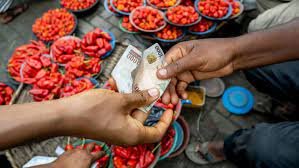Nigeria's inflation has surged to 27.33% in October 2023, a notable uptick from the previous month's 26.72%, according to the National Bureau of Statistics (NBS). This marks the tenth consecutive rise in the country's inflation rate this year, posing significant challenges for both consumers and policymakers.
The NBS report highlights that the headline inflation rate on a year-on-year basis is now 6.24% higher compared to October 2022, reaching 21.09%.
This indicates a sustained upward trajectory, reflecting the ongoing economic strain.

A closer look at the report reveals that food inflation has skyrocketed to 31.52%, driven by notable increases in the prices of essential items such as bread, yam, potatoes, and more. The surge in food prices contributes to the overall economic strain, with the report noting a 7.80% increase in food inflation compared to October 2022.
Residents in Kogi, Kwara, and Lagos are reportedly bearing the brunt of the rising cost of living, paying the highest for food in October. Kogi leads with a staggering 41.74% food inflation rate on a year-on-year basis. The report also indicates significant variations in food inflation on a month-on-month basis across different states, with Yobe, Sokoto, and Jigawa experiencing the highest spikes.
As inflation continues its upward trajectory, the report suggests a complex economic landscape ahead, with implications for both individual households and the broader national economy. Policymakers face the challenge of devising effective strategies to address the root causes of inflation, particularly in the realm of food prices, which directly impact the livelihoods of ordinary Nigerians.
This economic downturn adds to the prevailing challenges facing the nation, warranting close attention and strategic interventions to mitigate its far-reaching consequences.
The NBS report highlights that the headline inflation rate on a year-on-year basis is now 6.24% higher compared to October 2022, reaching 21.09%.
This indicates a sustained upward trajectory, reflecting the ongoing economic strain.

A closer look at the report reveals that food inflation has skyrocketed to 31.52%, driven by notable increases in the prices of essential items such as bread, yam, potatoes, and more. The surge in food prices contributes to the overall economic strain, with the report noting a 7.80% increase in food inflation compared to October 2022.
Residents in Kogi, Kwara, and Lagos are reportedly bearing the brunt of the rising cost of living, paying the highest for food in October. Kogi leads with a staggering 41.74% food inflation rate on a year-on-year basis. The report also indicates significant variations in food inflation on a month-on-month basis across different states, with Yobe, Sokoto, and Jigawa experiencing the highest spikes.
As inflation continues its upward trajectory, the report suggests a complex economic landscape ahead, with implications for both individual households and the broader national economy. Policymakers face the challenge of devising effective strategies to address the root causes of inflation, particularly in the realm of food prices, which directly impact the livelihoods of ordinary Nigerians.
This economic downturn adds to the prevailing challenges facing the nation, warranting close attention and strategic interventions to mitigate its far-reaching consequences.




